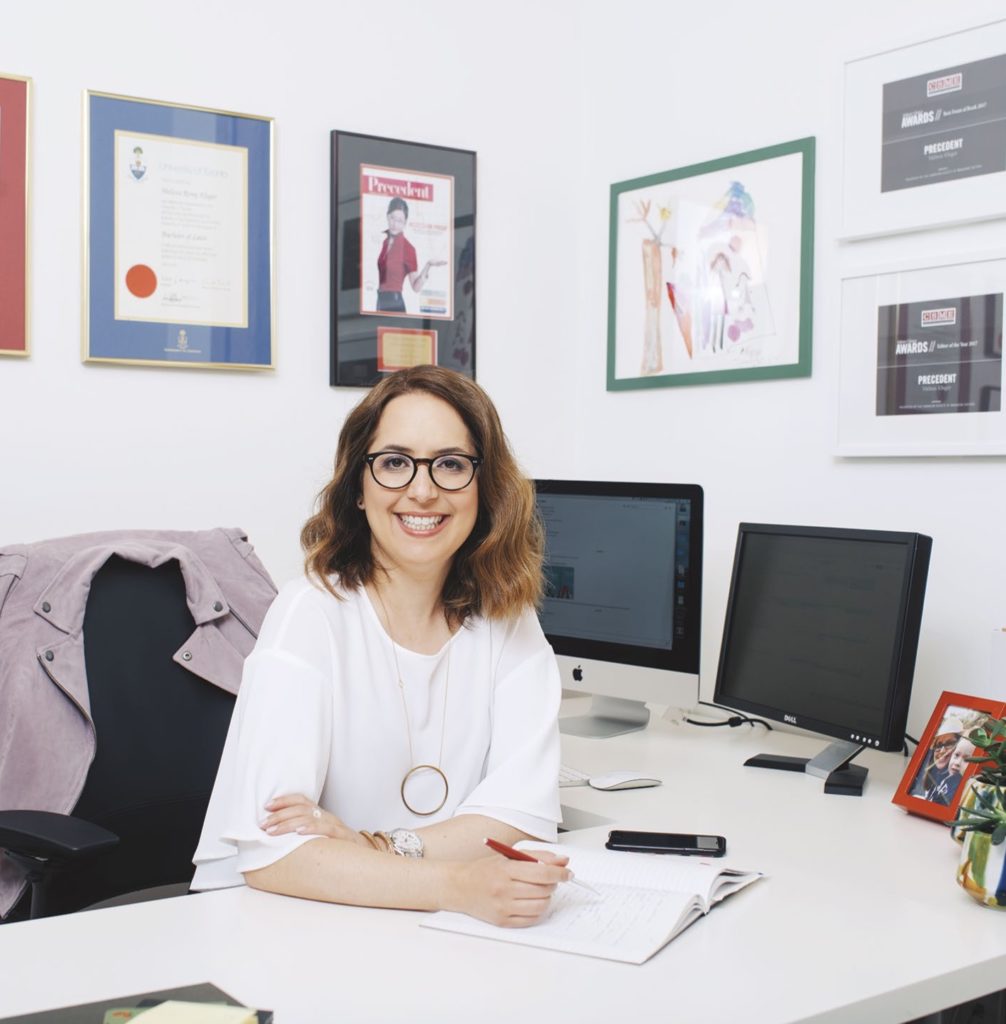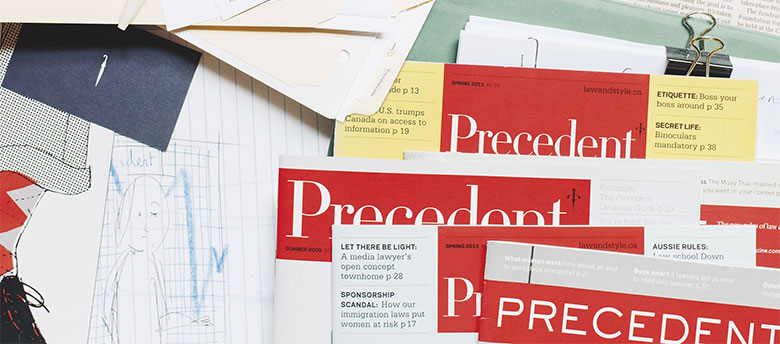It’s been 10 years since Melissa Kluger founded the magazine that sits in your hands. But why’d she quit her job as a lawyer to make it?
At root, she spotted a gap in the legal-media landscape. No magazine blended profiles of young, emerging lawyers with reporting on the shortcomings of the profession and stylish lifestyle writing. So that was the plan: to publish journalism that didn’t exist anywhere else.
That would have been hard enough. But six months into the life of the magazine, the financial crisis hit the legal market. Then the internet blew up the print-media business.
But Precedent continues to thrive. In this candid conversation with senior editor Daniel Fish, who joined the magazine four years ago, Kluger reflects on Precedent’s origins, how it’s changed and why she loves it so damn much.
Part One: The origin story

Editor Melissa Kluger, pictured here in her office at Precedent’s headquarters
Daniel Fish: You founded Precedent 10 years ago. But let’s go back almost 20 years, when you were a 2L at the University of Toronto. What were your plans at that moment?
Melissa Kluger: I went to law school knowing, in my heart, that I wanted to be a journalist.
DF: You never studied journalism, though. Why is that?
MK: Because of advice that my father, a chemistry professor, gave me. After my undergrad in English and politics, he told me, ‘Don’t go to journalism school — you can learn to write later. Master a subject. If you go to law school, you’ll get to spend three years thinking like a grad student. In the worst-case scenario, when you graduate, you have to work as a lawyer.’ So I went to law school.
DF: Once there, you founded Ultra Vires, the still-popular student newspaper.
MK: Pretty quickly, I noticed there was no outlet for students to share their stories — even though they did cool stuff, like winning competitions and landing social-justice internships. Oh, and they were funny. At the time, tuition was also rising sharply, and voices of dissent didn’t have a platform. I didn’t go to law school to start a newspaper, but once I got there, it was obvious that something was missing. I was, like, Damn it, I have to start a newspaper.
DF: What did you do after law school?
MK: First, I articled at Cassels Brock & Blackwell LLP. After that, I spent a few years working for a sole practitioner in media law. Then I spent a summer working with the Canadian general counsel for Yahoo.
DF: Did you hope that media law would scratch your itch for journalism?
MK: That was the idea, but it didn’t work out. Whenever I met journalists, they were facing a lawsuit, so it was one of the lowest moments in their careers. And most of the time, I was working away on legal research or document review, the most tedious parts of litigation. So the work wasn’t creative.
DF: When did you reach the turning point, where you considered not only leaving law but also launching your own magazine?
MK: During those first few years as a lawyer, I started to read the existing crop of legal magazines. None of them spoke to me. On every cover there was an old white man. And, perhaps more importantly, there was nothing in them about how to be a young professional. Something was missing. So I thought, Damn it, I have to start a magazine.
DF: What first steps did you take?
MK: I launched a blog — called lawandstyle.ca — that would help me build a voice and a following. I also quit my job.
DF: What did you do for money?
MK: I worked doc-review contracts, set my own hours and spent the rest of my time planning my magazine.
DF: Talk about that planning stage.
MK: I took a course at Ryerson University, called “So You Want to Start a Magazine?” Then I came up with the name, hired a designer to help build a prototype and came up with the identity of Precedent.
DF: How would you describe the identity at the very beginning?
MK: As a junior lawyer, I always met lawyers who were a few years ahead of me that seemed to know everything. Not only did they know what to do in court, but they also knew what to wear and the hottest restaurants in the city. So that’s what I wanted Precedent to be — that lawyer who had it all figured out.
Part Two: One shitstorm after another
DF: Having an idea is one thing. But before you could print your first issue, you also needed a business model. Our model has always been the same: to distribute the magazine for free and fund the entire enterprise through advertising. Which meant that you, the publisher and editor-in-chief, needed to start selling ads.
To get a sense of what the legal industry thought of your idea at the time, I spoke to our long-time advertiser, Adam Lepofsky, the founder and president of the recruitment firm RainMaker Group. Here’s what he told me: “No one could understand why associates might want a magazine that reflected their experience. People were really negative about it. They didn’t think anyone would read it.” Were you aware of that cynicism?
MK: It’s probably good that I wasn’t. I was so headstrong that what I was doing was important. And if Adam was one of the skeptics, he certainly didn’t let on. In fact, he bought an ad in that first issue and has advertised in every issue since.
DF: With that in mind, how did advertising sales go for the first issue?
MK: For a new magazine, they went well. Remember, this was mid-2007 and the legal market was hot. Recruiters from around the world, from London to Dubai, wanted to poach lawyers from the Canadian market. They saw Precedent as a way to reach young lawyers looking to make a change. They filled that first issue with ads.
DF: The moment the first issue dropped, though, you had to overcome an onslaught of obstacles. The first one came in the form of some competition from Canadian Lawyer.
MK: That’s right. The same week we launched, they decided to launch Canadian Lawyer Associates. This definitely confused both our readers and advertisers.
DF: What did that feel like?
MK: It was pretty shocking. I remember thinking, I’m about to launch my dream, something I’ve put everything I have into. And it’s this week that Canadian Lawyer, a magazine that has been around for 30 years, comes out with a competing magazine?
DF: The good news, of course, is that you beat them in the market: they only stuck around for five issues. The bad news is, that was hardly your only roadblock. Six months into the magazine’s lifespan, the global economy imploded.
MK: That changed everything. I lost those global recruiters as advertisers. I had also hoped to attract top-tier lifestyle brands, like Rolex and BMW, as advertisers. But the recession hit them, too.
DF: What was your solution?
MK: I relied on connections I’d made over those first two issues. For the most part, that meant turning to local legal suppliers who had weathered the recession, as well as law firms I had built relationships with.
DF: Now for the third shitstorm. As the economy cratered, so did the print-journalism industry. Over the past decade, traditional advertisers have taken the money they once gave to media and shifted it to tech giants, like Facebook and Google.
MK: But I had an advantage over traditional media. I hadn’t been making a print newspaper for 100 years. I launched this magazine with a website. I had a blog before people had blogs.
And, over the years, the biggest changes to our business model have been digital. Seven years ago, we launched the A-List, a website for legal jobs and career announcements. And last year, we built PrecedentJD.com, a website exclusively for Canadian law students. So we’ve been able to roll with it.
Part Three: The media mogul
DF: Editors have power. As the editor of Precedent, you get to give coverage to subjects and lawyers of your choice.
At the country’s largest newspapers, such decisions are motivated, in part, by ideology. Broadly speaking, the Star is on the left, the Globe is in the centre and the Post is on the right. Did you want your magazine to be political in the same way?

Editorial Assistant Stephanie Philp
MK: I wanted all lawyers to read the magazine and feel like it was for them. I have issues I care about, like the advancement of women and racialized lawyers in the profession. You might call that political, but it seems like diversity is something everybody should want.
DF: Let’s talk about diversity. Most media sources are full of men. A study from last year showed that, across Canadian newspapers and broadcasts, women represent 29 percent of all those quoted or interviewed. To see how we measured up, I went through our past year’s issues and women came in at 46 percent (54 out of 117). As the senior editor of those issues, I can say that, in all honesty, attaining gender parity wasn’t that hard.
MK: It’s not like this is an affirmative-action project. The profession is diverse and we reflect that.
DF: One big thing that has changed at Precedent is its mandate. When I joined the magazine, four years ago, this was no longer a magazine exclusively for young lawyers. Why did you make that change?
MK: I worried that once lawyers made partner, they’d put down the magazine and say, ‘That’s it! I’m done with Precedent.’ I didn’t want that to happen. I still want the magazine to skew young. It should promote emerging lawyers who wouldn’t have a place in other magazines, but the stories should appeal to everyone.
Part Four: How it’s made
DF: I want to give readers a window into what it takes to make this magazine. To do that, I’d like to get meta for a minute. Where are we sitting right now?
MK: Well, we’re in the boardroom at our headquarters, a brick-and-beam office at Front and Parliament, which I absolutely love.
DF: This is an important room. It’s here that, at the outset of every issue, we have our editorial meetings and work through our story ideas.
MK: This is where it all happens. How about you walk us through what happens next?

The Precedent staff, hard at work: marketing manager Lauren Parrott
DF: Sure! After we finalize our story list, we decide who will write each one. Even though we’re a small team — there’s the two of us, an online editor for our student website, an editorial assistant and a marketing manager — we write close to 50 percent of each issue in-house. We assign the rest to freelance writers and lawyer-columnists.
MK: Since you often write our feature stories, can you talk about what goes into that?
DF: I interview at least a dozen people, for perhaps an hour each, then transcribe those interviews and shape them into a narrative.
MK: How long would you say that takes?
DF: It’s hard to pinpoint an exact number, but maybe 70 hours. Then, when each story is complete, it goes through a rigorous editing process, which includes feedback from the editorial team, and then rewrites. Once stories are in perfect shape, we send them to a professional fact-checker.
MK: And fact-checkers don’t just confirm names and dates by searching the internet. They call everyone who is quoted in the story to confirm every single quote. All of this work takes time and energy, but it’s worth it.
Part Five: Why we do it
DF: Above all, what do you want lawyers to know about Precedent?
MK: Two things. First, we’re independent. This magazine was started by me! We aren’t owned by a large corporation, and we aren’t the mouthpiece for an industry organization. This is a magazine for lawyers first.
Our main priority is to deliver amazing content to our readers. We invest heavily in beautiful art and engaging editorial content to make a magazine that lawyers want to spend time with. I didn’t quit my law job to start a trade publication that lawyers would flip through at their desk and promptly recycle.
DF: And the second thing?

Melissa Kluger and Senior Editor Daniel Fish, in the Precedent boardroom
MK: That we care about and believe in the legal profession. When I started Precedent, a lot of lawyers told me they were jealous. Not because they wanted to start a magazine, but because I had found my passion and was pursuing it.
A lot of lawyers fall into law and aren’t totally happy with their careers. You often hear about long hours, demanding clients, struggles with work-life balance.
But lawyers should remember that their jobs can be pretty great. For the most part, they do challenging work with smart colleagues on interesting issues.
DF: Yet people often pitch us to write about lawyers who have quit their jobs to do something else.
MK: And we always turn them down. Our goal is to write about lawyers working as lawyers, who represent the profession’s best version of itself. You may know there are one or two bad jokes out there about lawyers.
DF: Oh, I’ve heard a few of those.
MK: In the public eye, lawyers get can a bad rap. But with Precedent, I want to turn that around. When lawyers read Precedent, I want them to feel inspired and proud of their profession.
How to support us
If you like the work we do at Precedent, you can show it in four ways:
1. Get our eNewsletter. Sign up for the Precedent eBrief to get our stories delivered straight to your inbox.
2. Advertise. Every quarter, we send the magazine for free to 15,000 lawyers in Toronto. And advertisements pay for it all: our staff, our freelance writers, our original art and so much more. If you want to get your message out to the legal community, let us help.
3. Follow us. This is an easy one. To make sure that our journalism reaches far and wide, follow us (and share our stories) on social media. We’re on Facebook, Twitter, Instagram and LinkedIn.
4. Pitch your ideas. In every issue, we write about lawyers doing amazing work. So if you know one (maybe it’s you?) get in touch with us! Our senior editor, Daniel Fish, is at daniel@precedentmagazine.com. After all, if you don’t tell us, how else are we going to find out?
This story is from our 10th anniversary issue, published in Fall 2017.
Photography by Ian Patterson. Hair and makeup by Michelle Calleja.


